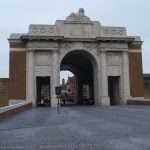Known unto God
Standing in the shadow of the great Menin Gate on 7th June, awaiting the Last Post Ceremony and the opportunity to escort a friend as he laid a wreath in memory of his great uncle who had died on 7th June 1917, 95 years previously, a trio stood before us with a wreath in memory of the Artists’ Rifles.
Perhaps the Artists’ rifles were a sufficient memorial to themselves, extraordinarily talented, they could articulate their thoughts in an incomparable manner. Among their ranks stood Edward Thomas, (whose poem Adlestrop is for me the most evocative poem I know, and, possibly, the greatest of the war poets, Wilfred Owen).
The poignancy of the moment at the Menin Gate becomes greater when one realizes that the fifty-five thousand men commemorated in its stonework, men who fell within a few miles in Flanders fields, have their names inscribed here because they have no known grave; they disappeared without trace – in explosions, in the mud, in the gunfire. Some may have graves, but so little of them remained that even their uniform could not be identified, ‘their headstones simply declaring, ‘A Soldier of the Great war – Known Unto God’.
Had Edward Thomas or Wilfred Owen survived, they might have given eloquent expression to the significance of the words marking the last resting place of their unknown comrades, ‘Known Unto God’.
Instead, as Remembrance Day approaches, I turned again to lines from Sebastian Faulks’ ‘Charlotte Gray’, words which in the novel are spoken by Levade, a Jew in Nazi occupied France; words which strive for some meaning for those commemorated at the Menin Gate, at the great arch at Thiepval, and at countless other cemeteries and graveyards through France and Belgium.
“No child born knows the world he is entering, and at the moment of his birth he is a stranger to his parents. When he dies, many years later, there may be regrets among those left behind that they never knew him better, but he is forgotten almost as soon as he dies because there is no time for others to puzzle out his life. After a few years he will be referred to once or twice by a grandchild, then by no one at all. Unknown at the moment of birth, unknown after death. This weight of solitude! A being unknown.
And yet, if I believe in God, I am known. On the tombs of the English soldiers, the ones too fragmented to have a name, I remember that they wrote ‘Known unto God’. By this they meant that here was a man, who did once have arms and legs and a father and a mother, but they could not find all the parts of him – least of all his name.
God will know me, even as I cannot know myself. If He created me, then He has lived with me. He knows the nature of my temptations and the manner of my failing. So I am not alone. I have for my companion the creator of the world.
At the hour of my death I would wish to be ‘known unto God’.”



Comments
Known unto God — No Comments
HTML tags allowed in your comment: <a href="" title=""> <abbr title=""> <acronym title=""> <b> <blockquote cite=""> <cite> <code> <del datetime=""> <em> <i> <q cite=""> <s> <strike> <strong>